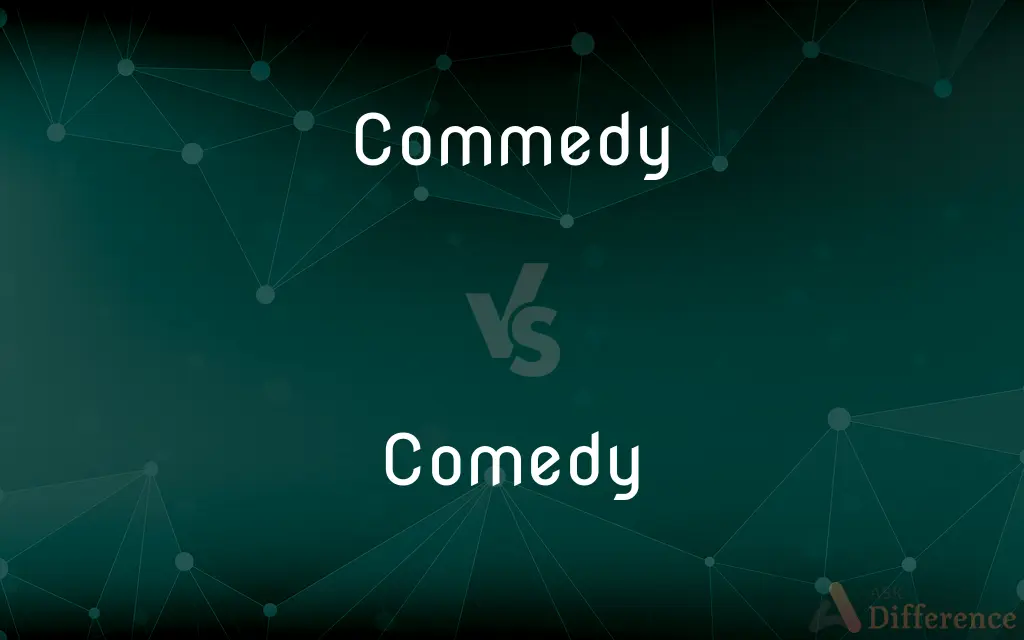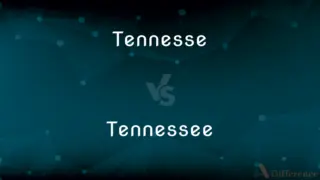Commedy vs. Comedy — Which is Correct Spelling?
By Tayyaba Rehman — Updated on March 25, 2024
"Commedy" is an incorrect spelling. The correct spelling is "Comedy," a genre of entertainment characterized by humor and amusement.

Table of Contents
Which is correct: Commedy or Comedy
How to spell Comedy?

Commedy
Incorrect Spelling

Comedy
Correct Spelling
ADVERTISEMENT
Key Differences
Remember it like "come-dy" as in "come and laugh."
Think of the phrase "comic relief," where "comic" has just one "m."
Visual cue: Imagine a single microphone (m) on a comedy stage.
There's only one "m" in "Comedy."
"Comedy" rhymes with "tragedy," and neither has double consonants.
ADVERTISEMENT
How Do You Spell Comedy Correctly?
Incorrect: Commedy shows are very popular on television.
Correct: Comedy shows are very popular on television.
Incorrect: We went to a commedy club last night.
Correct: We went to a comedy club last night.
Incorrect: His sense of humor is perfect for commedy.
Correct: His sense of humor is perfect for comedy.
Incorrect: I love watching stand-up commedy on weekends.
Correct: I love watching stand-up comedy on weekends.
Incorrect: She wants to become a commedy actress.
Correct: She wants to become a comedy actress.
Comedy Definitions
Comedy is a genre of entertainment designed to make people laugh.
The movie was a romantic comedy filled with hilarious moments.
Comedy refers to a play or film that is light-hearted and funny.
The local theater is hosting a comedy night this weekend.
Comedy is a situation or series of events characterized by humor and amusement.
Their attempt at baking turned into a complete comedy of errors.
Comedy is the art of writing or performing humorous content.
She has a natural talent for comedy and always leaves the audience laughing.
Comedy represents the comedic events in a story, especially as opposed to tragedy.
Shakespeare's plays often blended elements of comedy and tragedy.
Comedy (from the Greek: κωμῳδία, kōmōdía) is a genre of fiction comprised of discourses or works intended to be humorous or amusing by inducing laughter, especially in theatre, film, stand-up comedy, television, radio, books, or any other entertainment medium. The term originated in Ancient Greece: in Athenian democracy, the public opinion of voters was influenced by political satire performed by comic poets in theaters.
Professional entertainment consisting of jokes and sketches, intended to make an audience laugh
The show combines theatre with the best of stand-up comedy
A cabaret with music, dancing, and comedy
A play characterized by its humorous or satirical tone and its depiction of amusing people or incidents, in which the characters ultimately triumph over adversity
Shakespeare's comedies
A dramatic work that is light and often humorous or satirical in tone and that usually contains a happy resolution of the thematic conflict.
The genre made up of such works.
A literary or cinematic work of a comic nature or that uses the themes or methods of comedy.
Popular entertainment composed of jokes, satire, or humorous performance.
The art of composing or performing comedy.
A humorous element of life or literature
The human comedy of political campaigns.
A humorous occurrence.
A choric song of celebration or revel, especially in Ancient Greece.
(countable) A light, amusing play with a happy ending.
A narrative poem with an agreeable ending (e.g., The Divine Comedy).
A dramatic work that is light and humorous or satirical in tone.
(drama) The genre of such works.
(uncountable) Entertainment composed of jokes, satire, or humorous performance.
Why would you be watching comedy when there are kids starving right now?
The art of composing comedy.
(countable) A humorous event.
A dramatic composition, or representation of a bright and amusing character, based upon the foibles of individuals, the manners of society, or the ludicrous events or accidents of life; a play in which mirth predominates and the termination of the plot is happy; - opposed to tragedy.
With all the vivacity of comedy.
Are come to play a pleasant comedy.
Light and humorous drama with a happy ending
A comic incident or series of incidents
Comedy Meaning in a Sentence
My favorite type of comedy involves clever wordplay.
The school is putting on a comedy play next month.
His comedy routine includes a lot of funny observations about daily life.
The comedy club downtown is a great place to discover new talent.
The comedy movie we watched last night was hilarious.
They found the comedy show to be surprisingly insightful.
Many great authors have written comedy in addition to more serious works.
She has a natural talent for writing comedy sketches.
I think slapstick comedy is funniest when it's unexpected.
The comedy special on TV tonight features several famous comedians.
Improvisational comedy requires quick thinking and creativity.
Some historical events are so strange they could be written as comedy.
Comedy can be a way to address serious topics in a lighter manner.
The comedy festival attracts performers from all over the world.
They're hosting a comedy night to raise money for charity.
Her comedy album won several awards for its originality and humor.
She enjoys comedy that mixes in elements of romance.
Many comedians use their own experiences as material for their comedy.
The comedy podcast I listen to always cheers me up.
Understanding the cultural context can enhance the enjoyment of comedy.
Some of the best comedy comes from real-life situations.
A good comedy can make you laugh and think at the same time.
He's studying comedy writing to become a sitcom writer.
Learning to appreciate different types of comedy can expand your sense of humor.
Comedy and tragedy are two sides of the same coin in theater.
Common Curiosities
Which vowel is used before Comedy?
The letter "o" precedes the first "m."
What is the verb form of Comedy?
Comedy is a noun; it doesn't have a verb form. However, "comedic" is its adjective form.
What is the plural form of Comedy?
Comedies.
Which preposition is used with Comedy?
"Of" as in "comedy of errors" or "in" as in "in a comedy."
Why is it called Comedy?
It's derived from the Ancient Greek word "komōidia," meaning a comedic play or performance.
What is the root word of Comedy?
Derived from Ancient Greek "komōidia."
What is the singular form of Comedy?
Comedy.
Is Comedy an abstract noun?
Yes, it refers to a concept or genre.
What is the pronunciation of Comedy?
"KAH-muh-dee."
Which conjunction is used with Comedy?
No specific conjunction is uniquely associated with "comedy." It depends on the context.
Is Comedy a noun or adjective?
Comedy is a noun.
Is Comedy a collective noun?
No.
Is the Comedy term a metaphor?
By itself, no. But in phrases like "comedy of errors," it can be metaphorical.
Is Comedy a negative or positive word?
Generally positive, as it's associated with humor and amusement.
Is Comedy a vowel or consonant?
"Comedy" is a word, not a single letter, so it contains both vowels and consonants.
Is Comedy a countable noun?
Yes, e.g., "two comedies."
Is the word Comedy is imperative?
No, it's a noun.
Is Comedy an adverb?
No.
What is a stressed syllable in Comedy?
The first syllable, "Com."
What is the first form of Comedy?
As a noun, it doesn't have different forms like verbs. Its primary form is "comedy."
Which article is used with Comedy?
Either "a" or "the," depending on the context.
Is the word Comedy is Gerund?
No, it's a noun.
Is the word “Comedy” a Direct object or an Indirect object?
It can be either, depending on sentence structure. E.g., "I watched a comedy" (direct object).
What part of speech is Comedy?
Noun.
What is the second form of Comedy?
N/A.
How many syllables are in Comedy?
Three.
How do we divide Comedy into syllables?
Com-e-dy.
What is another term for Comedy?
Humor or farce.
What is the third form of Comedy?
N/A.
What is the opposite of Comedy?
Tragedy.
Which determiner is used with Comedy?
Any relevant determiner can be used, like "this," "that," "my," depending on context.
How is Comedy used in a sentence?
"The comedy show last night had everyone in stitches."
Share Your Discovery

Previous Comparison
Respondent vs. Respondant
Next Comparison
Infallable vs. InfallibleAuthor Spotlight
Written by
Tayyaba RehmanTayyaba Rehman is a distinguished writer, currently serving as a primary contributor to askdifference.com. As a researcher in semantics and etymology, Tayyaba's passion for the complexity of languages and their distinctions has found a perfect home on the platform. Tayyaba delves into the intricacies of language, distinguishing between commonly confused words and phrases, thereby providing clarity for readers worldwide.












































